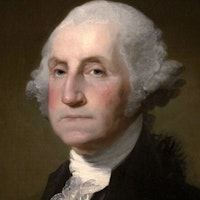Of all the dispositions and habits which lead to political prosperity, religion and morality are indispensable supports.
Of all the dispositions and habits which lead to political prosperity, religion and morality are indispensable supports.
George Washington

Religion and Morality
Theme: A Vision of America
“Of all the dispositions and habits, which lead to political prosperity, Religion and Morality are indispensable supports. In vain would that man claim the tribute of Patriotism, who should labor to subvert these great pillars of human happiness, these firmest props of the duties of Men and Citizens. The mere Politician, equally with the pious man, ought to respect and to cherish them. A volume could not trace all their connexions with private and public felicity.”
George Washington (February 22, 1732 – December 14, 1799) was an American statesman and soldier who served as the first President of the United States from 1789 to 1797. As one of the leading patriots, he was among the new nation's Founding Fathers, and served as commander-in-chief of the Continental Army during the American Revolutionary War. He presided over the 1787 convention. He also came to be known as the "Father of His Country."
[From Wikipedia]
Farewell Address
Wilson, Andrew, editor. World Scripture II. Universal Peace Federation, 2011, p. 981 [George Washington, Farewell Address].

George Washington
Theme: A Vision of America
Copyright © 2017 – 2026 LuminaryQuotes.com About Us

George Washington, Farewell Address
James Madison helped craft George Washington’s Farewell Address.
Additional Quotes from George Washington’s Farewell Address
“It is of infinite moment, that you should properly estimate the immense value of your national Union to your collective and individual happiness.
I have already intimated to you the danger of parties in the state, with particular reference to the founding of them on geographical discriminations. Let me now take a more comprehensive view, and warn you in the most solemn manner against the baneful effects of the spirit of party, generally…
The alternate domination of one faction over another, sharpened by the spirit of revenge, natural to party dissension, which in different ages and countries has perpetrated the most horrid enormities, is itself a frightful despotism. But this leads at length to a more formal and permanent despotism. The disorders and miseries, which result, gradually incline the minds of men to seek security and repose in the absolute power of an individual; and sooner or later the chief of some prevailing faction, more able or more fortunate than his competitors, turns this disposition to the purposes of his own elevation, on the ruins of Public Liberty…
The common and continual mischiefs of the spirit of party are sufficient to make it the interest and duty of a wise people to discourage and restrain it.
It serves always to distract the Public Councils, and enfeeble the Public Administration. It agitates the Community with ill-founded jealousies and false alarms; kindles the animosity of one part against another, foments occasionally riot and insurrection…”
— George Washington [The Farewell Address (17 September 1796)].
“Let us with caution indulge the supposition, that morality can be maintained without religion. Whatever may be conceded to the influence of refined education on minds of peculiar structure, reason and experience both forbid us to expect, that national morality can prevail in exclusion of religious principle.”
— George Washington [The Farewell Address (17 September 1796)].